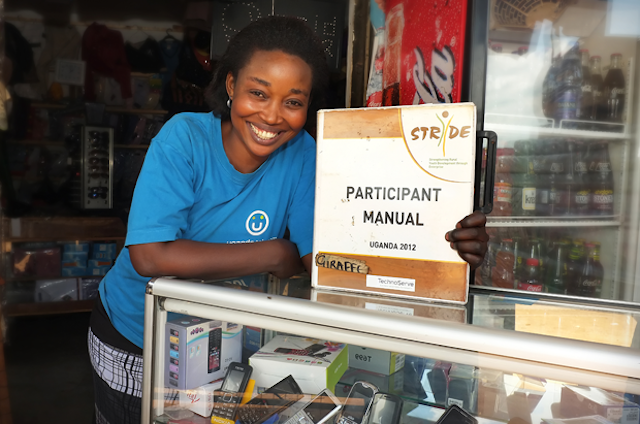Strengthening Rural Youth Development through Enterprise (STRYDE)
Strengthening Rural Youth Development through Enterprise (STRYDE)
TechnoServe Inc, Founded in 1952, HQ Washington DC
Kenya, Rwanda, Uganda, Tanzania
Website | Email
The Strengthening Rural Youth Development through Enterprise (STRYDE) works to im-prove the economic status of male and female rural vulnerable youth ages 18 to 30 in Uganda, Rwanda, Tanzania and Kenya. The model provides self-efficacy and business skills to start enterprises, secure formal jobs or engage in agribusiness.
 Challenge
Challenge
For most young people in rural community in East Africa, opportunities are scarce. With only 28% of Africa’s labor force holding stable wage-paying jobs, and most of those concentrated in urban areas, rural life can appear to offer little prospect for advancement. In addition, 3 in 10 East Africans are youth, 1 in 10 cannot find work, and the region lags in entrepreneurship Although analysis shows that rural youth migrate to cities to find better educational and work opportunities, over 70% of the African youth population remain in rural areas. They typically lack the confidence, skills, and knowledge to create or take advantage of economic engagement opportunities within their agriculture-based communities. While this demographic situation poses many potential challenges, it also presents tremendous opportunities for youth to lead a wave of economic growth, create innovative enterprises, and revitalize the agricultural sector.
 Solution and innovation
Solution and innovation
STRYDE is a 12-month program, (3 months of training and 9-month aftercare), delivered by community-based trainers and designed to equip youth with life and business skills needed to improve their livelihoods. STRYDE’s most innovative design element centers around our “systems” approach to sustainability. This approach involves transferring key STRYDE implementation functions to local partner organizations in the youth economic engagement ecosystem (namely government ministries, vocational training institutes, and community based organizations) to ensure that STRYDE training components will be carried out by local stakeholders into the future. Over the last year, STRYDE has been working closely with local partners to develop the systems and processes (sustainability toolkit) needed to sustain STRYDE long after the program ends.
Results
Eunice* is from a county in Central Kenya, and completed the STRYDE program in 2013. Prior to taking the STYRDE program, Eunice was enrolled at a polytechnic where she was learning beauty and hairdressing.
When she completed the STRYDE program, she began working at a local hairdressing shop. Although she had never saved prior to STRYDE, she took what she learned from the pro-gram and opened a bank account to begin saving, which she used to purchase her current business from the previous owner. This supports the causal pathway between youth in-creasing their savings and starting or expanding enterprises.
In addition to the hairdressing business, Eunice is supplementing her income with farming activities. She primarily farms maize, as she finds that it is easy to sell and store. She noted that she does not have to worry about marketing her maize as customers come to her home to purchase her produce. Eunice also noted that after saving her income from these activities she was able to buy chickens and a goat.
